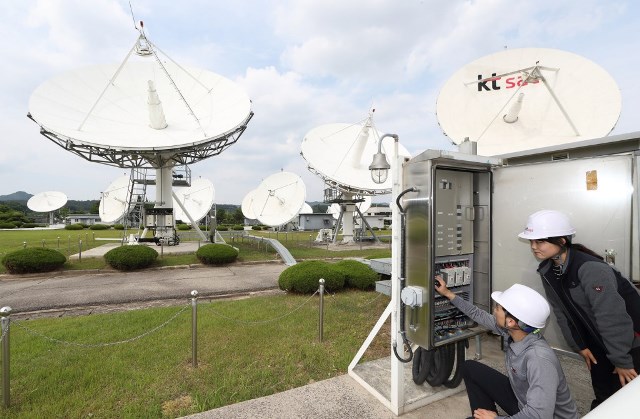
KT said it aims to grow its satellite business KT SAT to become the seventh-largest satellite operator in the world by 2025 from 18th rank.
It will focus on using the latest 5G mobile technologies in outer space, applying quantum cryptography to satellite communication, and providing a blockchain service for secure data sharing.
KT SAT expects to launch its satellite service in North Korea, a market for communications and broadcasting networks. KT Corp. has created a special task force to support inter-Korean cooperation and expand exchanges in ICT following the recent summit between North Korea and South Korea.
KT SAT is pushing for commercializing quantum cryptography with its satellites by joining KT Group’s drive to participate in the national project of research and development on the latest secure method of transferring data.
KT’s first satellite operator owns five satellites. The latest, KOREASAT-7 and KOREASAT-5A, were launched in May and October in 2017, respectively. KOREASAT-5A extended KT SAT’s coverage from the Korean peninsula to the Philippines, Indochina, the Middle East and parts of South Asia.
KOREASAT-7 covers the Philippines, Indonesia, Indochina and India.
The company is consulting with air carriers at home and abroad as it prepares to build global commercial networks via KOREASAT-5A communications satellite.
Currently serving some 500 ships that operate in international waters, KT SAT expects the number of its clients to increase sharply, particularly because a growing number of young people manning Korea’s deep-sea fishing vessels demand stable telecommunications and access to information.
In the domestic MVSAT market, KT SAT provides service to 35 percent of the ships in the 500-ton class, or 700 vessels, which operate in coastal waters. The goal is to have a 50 percent share, or 1,000 ships, by 2020.
The company will add services such as LTE, CCTV and satellite broadcasting for ships.
KT SAT is exploring the global MVSAT market through its KOREASAT-5A, whose high-powered, dedicated beams for global maritime communications cover Korea’s East Sea, the South and East China seas, the Bay of Bengal and the Arabian Sea.





